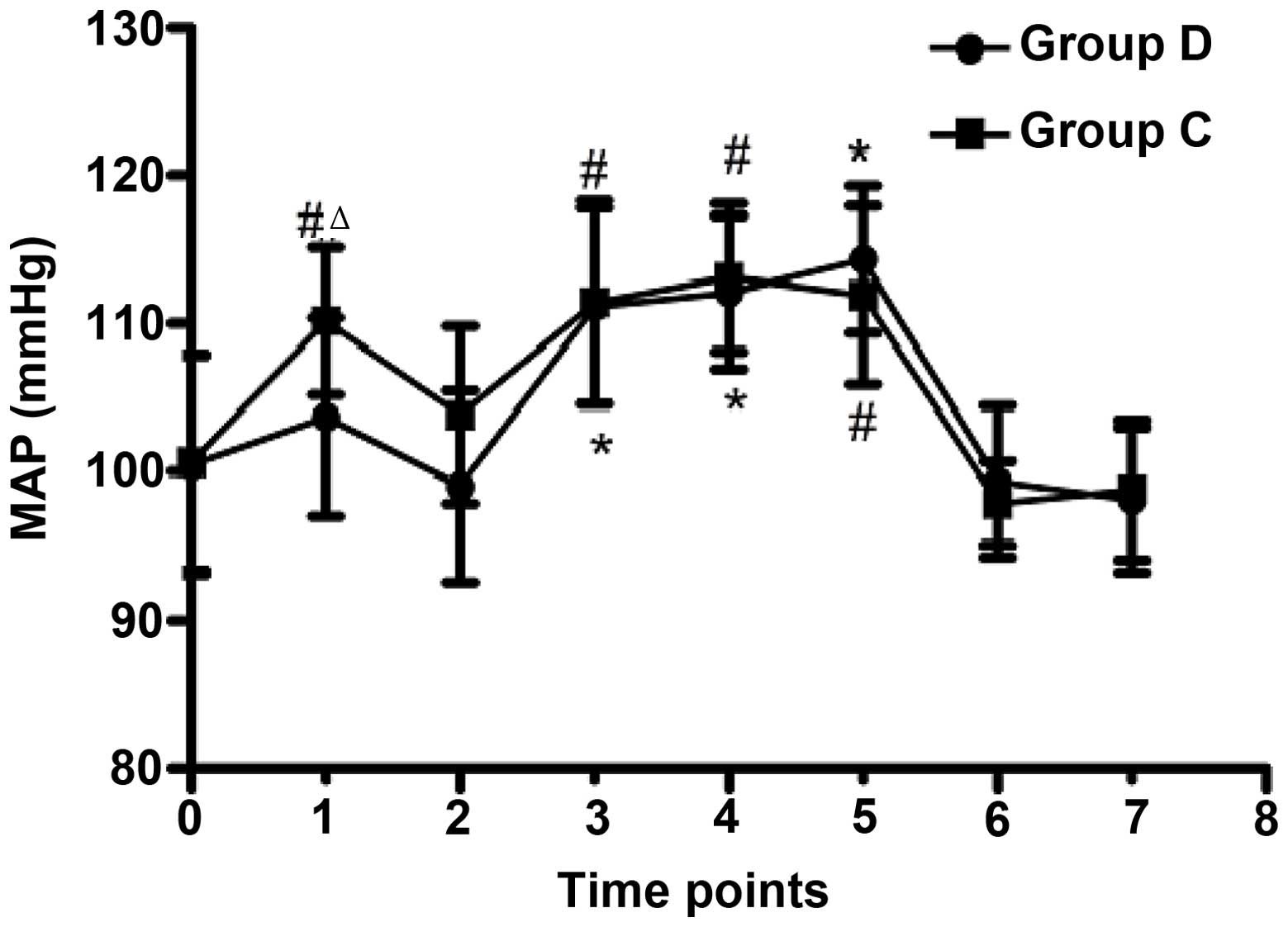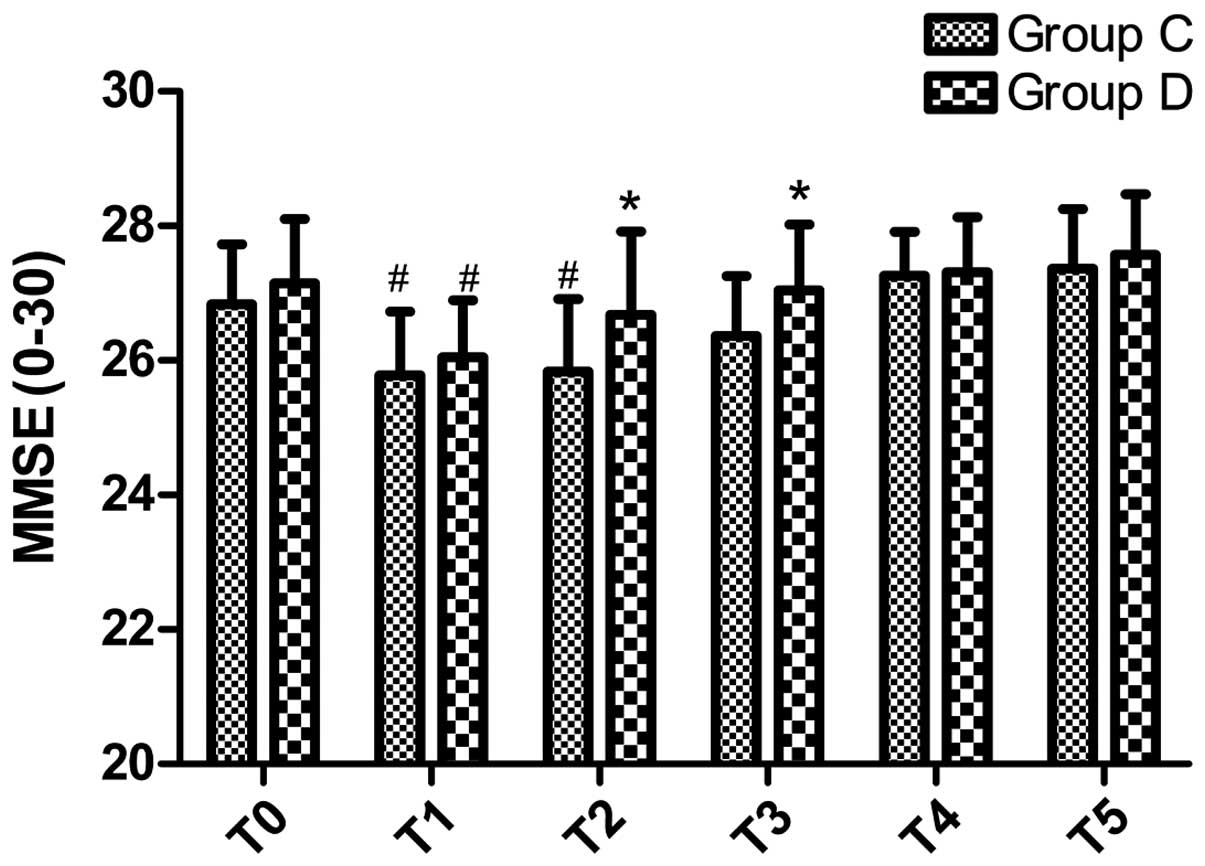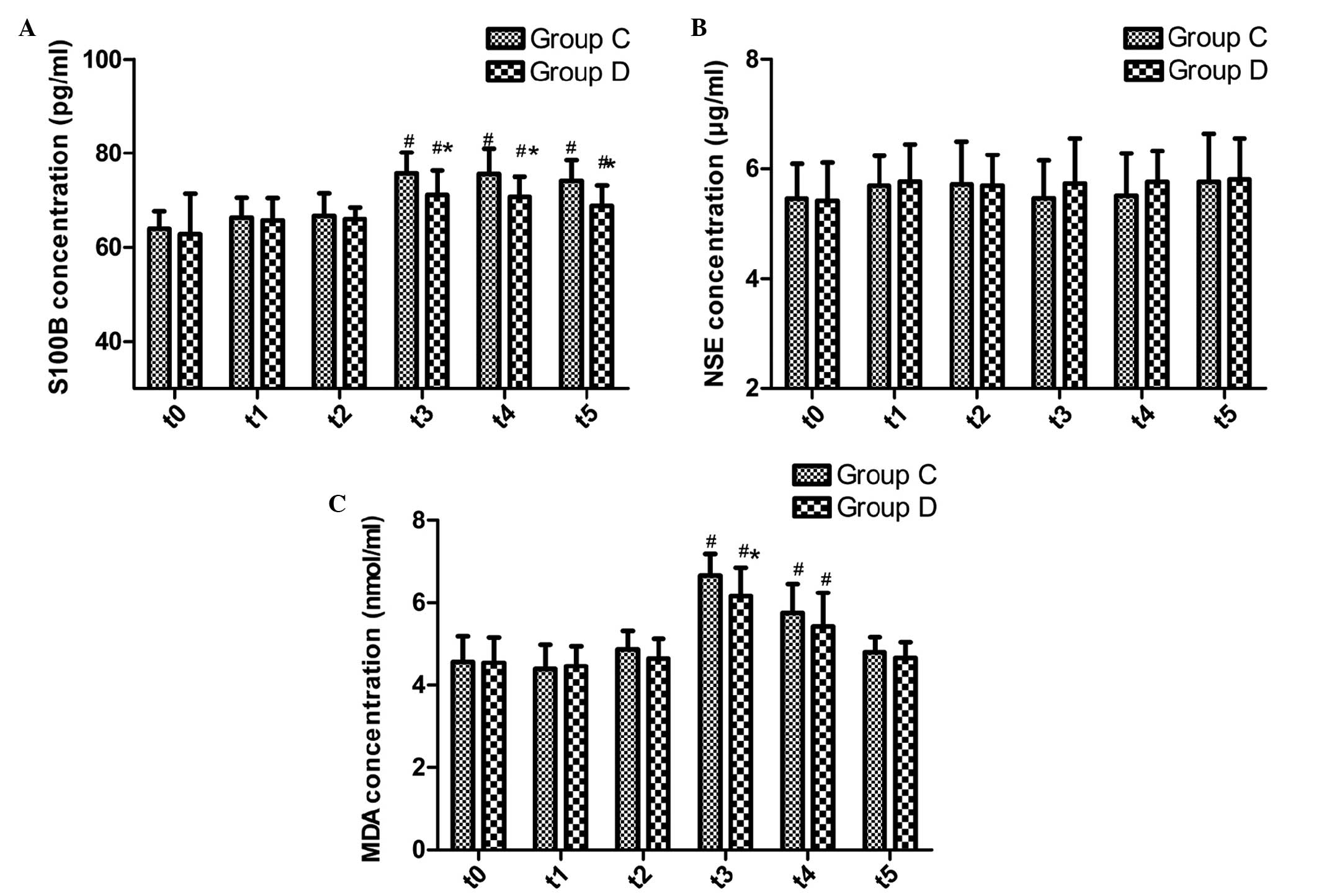|
1
|
Barnett HJ and Haines SJ: Carotid
endarterectomy for asymptomatic carotid stenosis. N Engl J Med.
317:1468. 1998.
|
|
2
|
North American Symptomatic Carotid
Endarterectomy Trial Collaborators: Beneficial effect of carotid
endarterectomy in symptomatic patients with high-grade carotid
stenosis. N Engl J Med. 325:445–453. 1991. View Article : Google Scholar : PubMed/NCBI
|
|
3
|
Halliday A, Mansfield A, Marro J, Peto C,
Peto R, Potter J and Thomas D: MRC Asymptomatic Carotid Surgery
Trial (ACST) Collaborative Group: Prevention of disabling and fatal
strokes by successful carotid endarterectomy in patients without
recent neurological symptoms: Randomised controlled trial. Lancet.
363:1491–1502. 2004. View Article : Google Scholar : PubMed/NCBI
|
|
4
|
Berman L, Pietrzak RH and Mayes L:
Neurocognitive changes after carotid revascularization: A review of
the current literature. J Psychosom Res. 63:599–612. 2007.
View Article : Google Scholar : PubMed/NCBI
|
|
5
|
De Rango P, Caso V, Leys D, Paciaroni M,
Lenti M and Cao P: The role of carotid artery stenting and carotid
endarterectomy in cognitive performance: A systematic review.
Stroke. 39:3116–3127. 2008. View Article : Google Scholar : PubMed/NCBI
|
|
6
|
Irvine CD, Gardner FV, Davies AH and
Lamont PM: Cognitive testing in patients undergoing carotid
endarterectomy. Eur J Vasc Endovasc Surg. 15:195–204. 1998.
View Article : Google Scholar : PubMed/NCBI
|
|
7
|
Heyer EJ, Sharma R, Rampersad A, Winfree
CJ, Mack WJ, Solomon RA, Todd GJ, McCormick PC, McMurtry JG, Quest
DO, et al: A controlled prospective study of neuropsychological
dysfunction following carotid endarterectomy. Arch Neurol.
59:217–222. 2002. View Article : Google Scholar : PubMed/NCBI
|
|
8
|
Heyer EJ, DeLaPaz R, Halazun HJ, Rampersad
A, Sciacca R, Zurica J, Benvenisty AI, Quest DO, Todd GJ, Lavine S,
et al: Neuropsychological dysfunction in the absence of structural
evidence for cerebral ischemia after uncomplicated carotid
endarterectomy. Neurosurgery. 58:474–480. 2006. View Article : Google Scholar : PubMed/NCBI
|
|
9
|
Guler G, Akin A, Tosun Z, Eskitascoglu E,
Mizrak A and Boyaci A: Single-dose dexmedetomidine attenuates
airway and circulatory reflexes during extubation. Acta
Anaesthesiol Scand. 49:1088–1091. 2005. View Article : Google Scholar : PubMed/NCBI
|
|
10
|
Goyagi T, Nishikawa T, Tobe Y and Masaki
Y: The combined neuroprotective effects of lidocaine and
dexmedetomidine after transient forebrain ischemia in rats. Acta
Anaesthesiol Scand. 53:1176–11832009. View Article : Google Scholar
|
|
11
|
Sato K, Kimura T, Nishikawa T, Tobe Y and
Masaki Y: Neuroprotective effects of a combination of
dexmedetomidine and hypothermia after incomplete cerebral ischemia
in rats. Acta Anaesthesiol Scand. 54:377–382. 2010. View Article : Google Scholar : PubMed/NCBI
|
|
12
|
Xu Y, Yan J, Zhou P, Li J, Gao H, Xia Y
and Wang Q: Neurotransmitter receptors and cognitive dysfunction in
Alzheimer's disease and Parkinson's disease. Prog Neurobiol.
97:1–13. 2012. View Article : Google Scholar : PubMed/NCBI
|
|
13
|
Milstein JA, Lehmann O, Theobald DE,
Dalley JW and Robbins TW: Selective depletion of cortical
noradrenaline by anti-dopamine beta-hydroxylase-saporin impairs
attentional function and enhances the effects of guanfacine in the
rat. Psychopharmacology (Berl). 190:51–63. 2007. View Article : Google Scholar : PubMed/NCBI
|
|
14
|
Sani NF, Belani LK, Sin CP, Rahman SN, Das
S, Chi TZ, Makpol S and Yusof YA: Effect of the combination of
gelam honey and ginger on oxidative stress and metabolic profile in
streptozotocin-induced diabetic Sprague-Dawley rats. Biomed Res
Int. 2014:1606952014.PubMed/NCBI
|
|
15
|
Wilson DA, Mocco J, D'Ambrosio AL, Komotar
RJ, Zurica J, Kellner CP, Hahn DK, Connolly ES, Liu X, Imielinska C
and Heyer EJ: Post-carotid endarterectomy neurocognitive decline is
associated with cerebral blood flow asymmetry on post-operative
magnetic resonance perfusion brain scans. Neurol Res. 30:302–306.
2008. View Article : Google Scholar : PubMed/NCBI
|
|
16
|
Wolf O, Heider P, Heinz M, Poppert H,
Sander D, Greil O, Weiss W, Hanke M and Eckstein HH: Microembolic
signals detected by transcranial Doppler sonography during carotid
endarterectomy and correlation with serial diffusion-weighted
imaging. Stroke. 35:e373–e375. 2004. View Article : Google Scholar : PubMed/NCBI
|
|
17
|
Sabbagh M, Cummings J, Christensen D,
Doody R, Farlow M, Liu L, Mackell J and Fain R: Evaluating the
cognitive effects of donepezil 23 mg/d in moderate and severe
Alzheimer's disease: Analysis of effects of baseline features on
treatment response. BMC Geriatr. 13:562013. View Article : Google Scholar : PubMed/NCBI
|
|
18
|
Mukonzo JK, Okwera A, Nakasujja N, Luzze
H, Sebuwufu D, Ogwal-Okeng J, Waako P, Gustafsson LL and Aklillu E:
Influence of efavirenz pharmacokinetics and pharmacogenetics on
neuropsychological disorders in Ugandan HIV-positive patients with
or without tuberculosis: A prospective cohort study. BMC Infect
Dis. 13:2612013. View Article : Google Scholar : PubMed/NCBI
|
|
19
|
Arpaci AH and Bozkırlı F: Comparison of
sedation effectiveness of remifentanil-dexmedetomidine and
remifentanil-midazolam combinations and their effects on
postoperative cognitive functions in cystoscopies: A randomized
clinical trial. J Res Med Sci. 18:107–114. 2013.PubMed/NCBI
|
|
20
|
Arciniegas DB, Kellermeyer GF, Bonifer NM,
Anderson-Salvi KM and Anderson CA: Screening for cognitive decline
following single known stroke using the Mini-Mental State
Examination. Neuropsychiatr Dis Treat. 7:189–196. 2011. View Article : Google Scholar : PubMed/NCBI
|
|
21
|
Capoccia L, Sbarigia E, Rizzo A, Mansour W
and Speziale F: Silent stroke and cognitive decline in asymptomatic
carotid stenosis revascularization. Vascular. 20:181–187. 2012.
View Article : Google Scholar : PubMed/NCBI
|
|
22
|
Gaunt ME, Martin PJ, Smith JL, Rimmer T,
Cherryman G, Ratliff DA, Bell PR and Naylor AR: Clinical relevance
of intraoperative embolization detected by transcranial Doppler
ultrasonography during carotid endarterectomy: A prospective study
of 100 patients. Br J Surg. 81:1435–1439. 1994. View Article : Google Scholar : PubMed/NCBI
|
|
23
|
Kügler CF, Funk H, Vlajic P and Platt D:
The relationship between endothelin-1, event-related P300
potentials, and prognosis in cerebral arteriosclerosis. J Am
Geriatr Soc. 45:427–434. 1997. View Article : Google Scholar : PubMed/NCBI
|
|
24
|
Aleksic M, Huff W, Hoppmann B, Heckenkamp
J, Pukrop R and Brunkwall J: Cognitive function remains unchanged
after endarterectomy of unilateral internal carotid artery stenosis
under local anaesthesia. Eur J Vasc Endovasc Surg. 31:616–621.
2006. View Article : Google Scholar : PubMed/NCBI
|
|
25
|
Weber CF, Friedl H, Hueppe M, Hintereder
G, Schmitz-Rixen T, Zwissler B and Meininger D: Impact of general
versus local anesthesia on early postoperative cognitive
dysfunction following carotid endarterectomy: GALA Study Subgroup
Analysis. World J Surg. 33:1526–1532. 2009. View Article : Google Scholar : PubMed/NCBI
|
|
26
|
Chen J, Yan J and Han X: Dexmedetomidine
may benefit cognitive function after laparoscopic cholecystectomy
in elderly patients. Exp Ther Med. 5:489–494. 2013.PubMed/NCBI
|
|
27
|
Galeotti N, Bartolini A and Ghelardini C:
Alpha-2 agonist-induced memory impairment is mediated by the
alpha-2A-adrenoceptor subtype. Behav Brain Res. 153:409–417. 2004.
View Article : Google Scholar : PubMed/NCBI
|
|
28
|
Sanders RD, Sun P, Patel S, Li M, Maze M
and Ma D: Dexmedetomidine provides cortical neuroprotection: Impact
on anaesthetic-induced neuroapoptosis in the rat developing brain.
Acta Anaesthesiol Scand. 54:710–716. 2010. View Article : Google Scholar : PubMed/NCBI
|
|
29
|
Zhang XY, Liu ZM, Wen SH, Li YS, Li Y, Yao
X, Huang WQ and Liu KX: Dexmedetomidine administration before, but
not after, ischemia attenuates intestinal injury induced by
intestinal ischemia-reperfusion in rats. Anesthesiology.
116:1035–1046. 2012. View Article : Google Scholar : PubMed/NCBI
|
|
30
|
Yoshitomi O, Cho S, Hara T, Shibata I,
Maekawa T, Ureshino H and Sumikawa K: Direct protective effects of
dexmedetomidine against myocardial ischemia-reperfusion injury in
anesthetized pigs. Shock. 38:92–97. 2012. View Article : Google Scholar : PubMed/NCBI
|
|
31
|
Gu J, Sun P, Zhao H, Watts HR, Sanders RD,
Terrando N, Xia P, Maze M and Ma D: Dexmedetomidine provides
renoprotection against ischemia-reperfusion injury in mice. Crit
Care. 15:R1532011. View
Article : Google Scholar : PubMed/NCBI
|
|
32
|
Si Y, Bao H, Han L, Shi H, Zhang Y, Xu L,
Liu C, Wang J, Yang X, Vohra A and Ma D: Dexmedetomidine protects
against renal ischemia and reperfusion injury by inhibiting the
JAK/STAT signaling activation. J Transl Med. 11:1412013. View Article : Google Scholar : PubMed/NCBI
|
|
33
|
Saito H, Ogasawara K, Komoribayashi N,
Kobayashi M, Inoue T, Otawara Y and Ogawa A: Concentration of
malondialdehyde-modified low-density lipoprotein in the jugular
bulb during carotid endarterectomy correlates with development of
postoperative cognitive impairment. Neurosurgery. 60:1067–1073.
2007. View Article : Google Scholar : PubMed/NCBI
|
|
34
|
Mori T, Asano T and Town T: Targeting
S100B in cerebral ischemia and in Alzheimer's disease. Cardiovasc
Psychiatry Neurol. 2010:6870672010. View Article : Google Scholar : PubMed/NCBI
|
|
35
|
Leclerc E, Sturchler E and Vetter SW: The
S100B/RAGE axis in Alzheimer's disease. Cardiovasc Psychiatry
Neurol. 2010:5395812010. View Article : Google Scholar : PubMed/NCBI
|
|
36
|
Bell K, Shokrian D, Potenzieri C and
Whitaker-Azmitia PM: Harm avoidance, anxiety, and response to
novelty in the adolescent S-100beta transgenic mouse: Role of
serotonin and relevance to Down syndrome. Neuropsychopharmacology.
28:1810–1816. 2003. View Article : Google Scholar : PubMed/NCBI
|
|
37
|
Sorci G, Bianchi R, Riuzzi F, Tubaro C,
Arcuri C, Giambanco I and Donato R: S100B protein, a
damage-associated molecular pattern protein in the brain and heart,
and beyond. Cardiovasc Psychiatry Neurol. 2010:6564812010.
View Article : Google Scholar : PubMed/NCBI
|
|
38
|
Peng M, Wang YL, Wang FF, Chen C and Wang
CY: The cyclooxygenase-2 inhibitor parecoxib inhibits
surgery-induced proinflammatory cytokine expression in the
hippocampus in aged rats. J Surg Res. 178:e1–e8. 2012. View Article : Google Scholar : PubMed/NCBI
|
|
39
|
Rosén H, Sunnerhagen KS, Herlitz J,
Blomstrand C and Rosengren L: Serum levels of the brain-derived
proteins S-100 and NSE predict long-term outcome after cardiac
arrest. Resuscitation. 49:183–191. 2001. View Article : Google Scholar : PubMed/NCBI
|
|
40
|
Rech TH, Vieira SR, Nagel F, Brauner JS
and Scalco R: Serum neuron-specific enolase as early predictor of
outcome after in-hospital cardiac arrest: A cohort study. Crit
Care. 10:R1332006. View
Article : Google Scholar : PubMed/NCBI
|

















